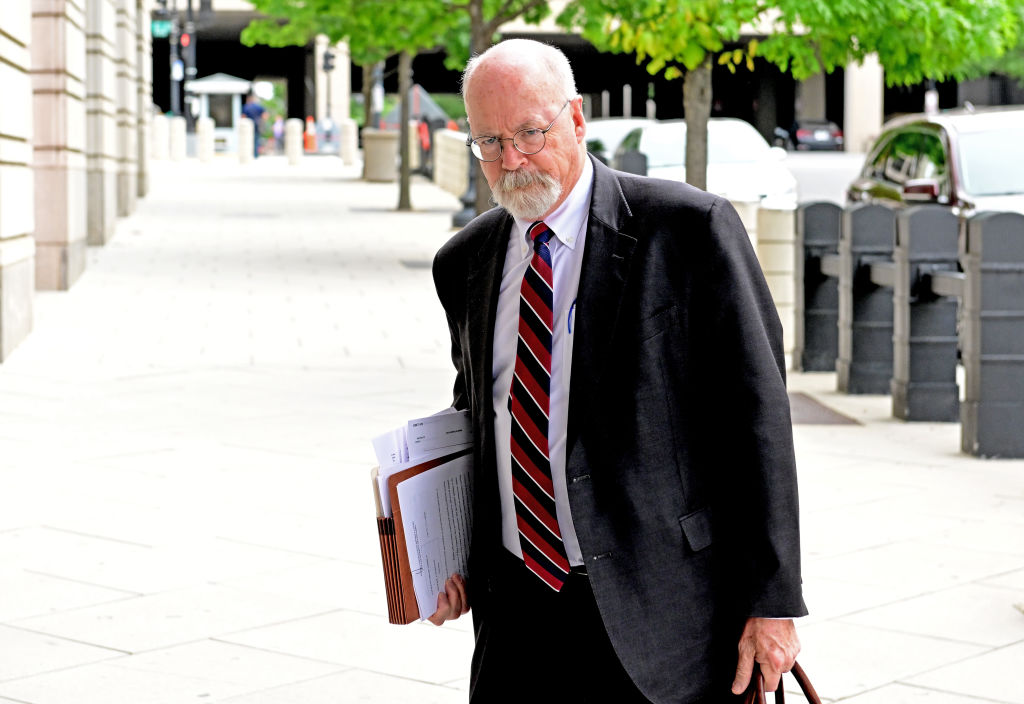‘Donald Trump should be given back his access to social media’
Your digest of analysis and commentary from the British and international press

- 1. He’s a puerile bully, but Donald Trump should not be banned from social media forever
- 2. Starmer’s pitiful pitch to England’s north-east is a recipe for more disasters
- 3. Moral superiority is the curse of our times
- 4. How infographic activism took over social media
- 5. The Colonial Pipeline cyber attack is a warning of worse to come
A free daily email with the biggest news stories of the day – and the best features from TheWeek.com
You are now subscribed
Your newsletter sign-up was successful
1. He’s a puerile bully, but Donald Trump should not be banned from social media forever
Ian Burrell in the i newspaper
on a sledgehammer solution
“You might think the world has enough problems just now but, sooner or later, Donald Trump should be given back his access to social media,” argues Ian Burrell in the i newspaper. “Yes, it’s been a relief that for the past four-and-a-half months, as the world focuses on vaccine rollouts and increased tension in the Middle East, ‘The Donald’ has been unable to contribute to debate with his usual torrent of incendiary online posts,” he writes. “But arbitrary and permanent censorship is not the way to go – it’s the kind of sledgehammer solution that would appeal to an authoritarian, loudmouthed bully like the 45th president.” “Trump is Potus no longer, and he should not be granted the special status of a deposed king in exile.” Burrell concludes: “In due course, he should be reinstated on social media and if he breaks the rules he should be penalised again. Just like a grounded child.”
The Week
Escape your echo chamber. Get the facts behind the news, plus analysis from multiple perspectives.

Sign up for The Week's Free Newsletters
From our morning news briefing to a weekly Good News Newsletter, get the best of The Week delivered directly to your inbox.
From our morning news briefing to a weekly Good News Newsletter, get the best of The Week delivered directly to your inbox.
2. Starmer’s pitiful pitch to England’s north-east is a recipe for more disasters
Alex Niven in The Guardian
on Labour hinterlands
The circumstances behind Labour’s “extraordinary” defeat in Hartlepool “tell us much about the party under [Keir] Starmer,” says Alex Niven in The Guardian. “The Labour leadership seems to imagine ‘red wall’ seats such as Hartlepool as dim hinterlands full of patriotic, socially conservative, working-class voters – the polar opposite of a caricatured ‘metropolitan elite',” he writes. “According to this reading, the task of rebuilding support in these areas is a simple case of airlifting Saint George flags into town during election campaigns and repeating hollow, patronising cliches about ‘trust’ and ‘competence’. But people in the north-east are like people everywhere else: intelligent enough to want more than mere competence and diverse enough that they deserve to be treated with nuance,” he continues. “Neither were apparent in the ‘pints and flags’ pitch that Labour made to the Hartlepool electorate.”
A free daily email with the biggest news stories of the day – and the best features from TheWeek.com
3. Moral superiority is the curse of our times
Libby Purves in The Times
on virtuousness
“As a person, family, institution or even a nation it is fatally easy to think of yourself as on the side of the angels. Badness is what the other lot do,” writes Libby Purves in The Times. “We make mistakes but innocently; we mean well, our tiny faults are loveable.” It’s easy to see how this “blindness” to our own fallibility occurs: “the blazing goodness of your charity or your cause blots out the possibility that you are also doing bad things. The principle applies right down to the level of individual absurdity: like David Cameron convinced that his lobbying as an employee and shareholder of Greensill Capital was ‘absolutely in the interests of the public good’,” Purves continues. “This ability to believe in your own virtue, provided you utter the approved slogans, is neither logical nor helpful but it’s a key marker of the modern world.”
4. How infographic activism took over social media
Poppy Coburn in UnHerd
on pre-packaged opinions
“If Instagram could speak its algorithms would say: ‘you are important, and you could – yes, you! – solve the crisis in the Middle East,” writes Poppy Coburn in UnHerd. The social media platform can provide you with a “myriad of ready-made hot takes to select from at your leisure”. Anyone with a social media presence is likely to have come across an ‘infographic’ in recent years: “these perfectly-sharable little images are jam-packed with dubiously sourced factoids addressing the hot-button issues of the current moment.” The demand for these infographics is “enormous” and not necessarily a case of “slacktivism”. But an over-reliance on these “quippy cartoon strawmen on pastel backgrounds” demonstrates “the difficulty people have with maintaining attention to complex issues”. And it presents a greater problem still, argues Coburn, Instead of “on-the-ground journalistic coverage setting the agenda for political debate, legacy media institutions now often find themselves playing catch-up with dubious narratives already formed on social media”.
5. The Colonial Pipeline cyber attack is a warning of worse to come
Misha Glenny in the Financial Times
on ransomware
“The cyber attack on Colonial Pipeline, which transports 45 per cent of oil consumed on the east coast of the US, should be the event that finally wakes everyone up,” writes Misha Glenny in the Financial Times. If the consequences of the attack “don’t alert people to the seriousness of the rapidly-spreading plague of ransomware, then it is hard to conceive of what will”, he writes. “The proliferation of devices and innovative software has collided with inadequate cybersecurity regimes, lowering the barriers to entry for criminal activity so that they scarcely exist.” If a “two-bit outfit” like DarkSide, the criminal organisation thought to be behind the Colonial Pipeline cyber-attack, can halt the flow of oil into half the US “just imagine what a state actor with real resources is capable of”.
-
 Gisèle Pelicot’s ‘extraordinarily courageous’ memoir is a ‘compelling’ read
Gisèle Pelicot’s ‘extraordinarily courageous’ memoir is a ‘compelling’ readIn the Spotlight A Hymn to Life is a ‘riveting’ account of Pelicot’s ordeal and a ‘rousing feminist manifesto’
-
 The EU’s war on fast fashion
The EU’s war on fast fashionIn the Spotlight Bloc launches investigation into Shein over sale of weapons and ‘childlike’ sex dolls, alongside efforts to tax e-commerce giants and combat textile waste
-
 How to Get to Heaven from Belfast: a ‘highly entertaining ride’
How to Get to Heaven from Belfast: a ‘highly entertaining ride’The Week Recommends Mystery-comedy from the creator of Derry Girls should be ‘your new binge-watch’
-
 Flies attack Donald Trump
Flies attack Donald TrumpTall Tales And other stories from the stranger side of life
-
 Donald Trump criminal charges for 6 January could strain 2024 candidacy
Donald Trump criminal charges for 6 January could strain 2024 candidacySpeed Read Former president’s ‘pettifoggery’ won’t work well at trial, said analyst
-
 Donald Trump in the dock: a fraught moment for US democracy
Donald Trump in the dock: a fraught moment for US democracyTalking Point There is speculation that former president could end up running his 2024 election campaign from behind bars
-
 Donald Trump indicted again: is latest threat of prison a game changer?
Donald Trump indicted again: is latest threat of prison a game changer?Today's Big Question The former president ‘really could be going to jail’ but Republicans ‘may not care’ say commentators
-
 Trump told he could face charges over classified Mar-a-Lago documents
Trump told he could face charges over classified Mar-a-Lago documentsSpeed Read A second criminal indictment is on the cards for the former US president and current Republican frontrunner
-
 Can the US stop Chinese cyberattacks?
Can the US stop Chinese cyberattacks?Today's Big Question Chinese hackers reportedly outnumber FBI cyber personnel by a ratio of 50 to 1
-
 The return of Donald Trump to prime-time television
The return of Donald Trump to prime-time televisionfeature CNN executives have been condemned over the former president’s televised town hall
-
 Durham criticizes FBI, offers little new in final report on 4-year Trump-Russia investigation review
Durham criticizes FBI, offers little new in final report on 4-year Trump-Russia investigation reviewSpeed Read